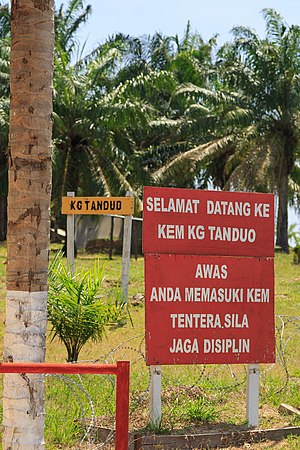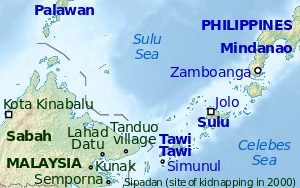| 2013 Lahad Datu standoff Lahad Datu incursion[7] Operation Daulat | |||||||||
|---|---|---|---|---|---|---|---|---|---|
| Part of the North Borneo dispute and cross border attacks in Sabah | |||||||||
 The entrance to the first site of the standoff in Kampung Tanduo, now a Malaysian Army camp. The signboard reads (in Malay), "Welcome to the Tanduo Village Camp. Caution! You have entered a military camp. Please maintain your discipline!".  Location map of the standoff | |||||||||
| |||||||||
| Belligerents | |||||||||
|
Filipino illegal immigrants (non-combative)[1] Supported by: |
Supported by: | ||||||||
| Commanders and leaders | |||||||||
|
|
Supported by: | ||||||||
| Units involved | |||||||||
|
|
Supported elements: Philippine elements: | ||||||||
| Strength | |||||||||
|
235 militants (Filipino media claimed)[17][18] 400 militants (Kiram claimed)[19][20] |
Malaysia strength | ||||||||
| Casualties and losses | |||||||||
|
| ||||||||
|
All statistics reference:[8][24][25][26] Note: All these total only during the standoff and does not include the total in any further actions. | |||||||||
The 2013 Lahad Datu standoff, also known as the Lahad Datu incursion or Operation Daulat (Malay: Operasi Daulat), was a military conflict in Lahad Datu, Malaysia.[8] The conflict began on 11 February, when 235 militants[17] arrived in Lahad Datu by boat, and ended on 24 March.[15][27][28] The militants, self proclaimed as "Royal Security Forces of the Sultanate of Sulu and North Borneo",[15] were sent by Jamalul Kiram III, a claimant to the throne of the Sultanate of Sulu.
The militants' stated objective was to assert the territorial claim of the Philippines to eastern Sabah.[29] Malaysian security forces surrounded the village where the group had gathered. After weeks of negotiations and several deadlines for the group to withdraw, the killing of local policemen prompted Malaysian security forces to flush out the militants with a military operation.[30] At the end of the standoff around 72 people were left dead, including 56 militants, 10 Malaysian security force personnel, and 6 civilians. The surviving militants were all either captured or escaped.
The Lahad Datu incursion has had lasting impacts for the people of Sabah.[31] Before this incursion, the government of Malaysia continued to dutifully pay an annual cession payment amounting to roughly $1,000 to the indirect heirs of the Sultan honoring an 1878 agreement, where North Borneo – today’s Sabah – was conceded by the late Sultan of Sulu to a British company.[32][33] However, Malaysia suspended these payments in response to this attack that killed civilians and members of the Malaysian armed forces. Years later, eight of these Sulu heirs, who insisted they were not involved in the standoff, hired lawyers to pursue legal action based on the original commercial deal.[34] The case is still ongoing.[needs update]
- ^ a b Kanul Gindol (31 May 2014). "'Localised' illegal immigrants helping 'foreign' relatives in Sabah". The Ant Daily. Archived from the original on 1 July 2014. Retrieved 21 June 2014.
- ^ Teoh El Sen (14 March 2013). "MNLF supports Sulu claim, says Nur Misuari faction". Astro Awani. Retrieved 13 June 2014.
- ^ "Villagers beat gunman to death". Bernama. Free Malaysia Today. 3 March 2013. Archived from the original on 5 March 2013. Retrieved 11 October 2013.
- ^ "Semporna villagers beat to death ex-Moro commander". The Star. 3 March 2013. Retrieved 11 October 2013.
- ^ "Sabahans will not forget Lahad Datu incident — Musa". Bernama. The Borneo Post. 30 June 2013. Retrieved 11 October 2013.
- ^ a b Michael Lim Ubac (7 March 2013). "Aquino: I won't allow Sulu sultan to drag PH into war with Malaysia". Philippine Daily Inquirer. Archived from the original on 24 July 2014. Retrieved 7 March 2013.
President Aquino said in a statement, 'I appeal to you (Jamalul Kiram III) — we should be really clear on this — this incident is wrong. If this is wrong, why should we (the government) lend support to this? We should support what is right... which will lead us to brighter prospects; the wrong option will only bring us ruin. That's it, that's my simple message.' He also added 'Let's not forget: What they (the Jamalul Kiram III faction) are pushing for is their right as so-called heirs of the sultan of Sulu. It's not yet clear if their rights have been transferred to the Philippines. But we (the Philippines citizens and our nation) will all be affected by their conflict (with Malaysia).'
- ^ a b Jasmine Jawhar; Kennimrod Sariburaja (2016). The Lahad Datu Incursion and its Impact on Malaysia's Security (PDF). National Library of Malaysia. pp. 17–19. ISBN 978-983-44397-8-1. Archived from the original (PDF) on 8 March 2018. Retrieved 12 March 2017.
{{cite book}}:|work=ignored (help) - ^ a b c Cite error: The named reference
statswas invoked but never defined (see the help page). - ^ "Lahad Datu: Sulu gunmen in Kg Tanduo have been totally defeated, say police sources". The Star. 5 March 2013. Retrieved 6 March 2013.
- ^ "Security forces in full control of Sabah's east coast: Police". The Brunei Times. The Star/ANN. 8 February 2014. Archived from the original on 2 April 2015. Retrieved 20 June 2014.
- ^ Muguntan Vanar (29 June 2013). "Lahad Datu: Ops Daulat officially ends today". The Star. Archived from the original on 30 October 2013. Retrieved 11 October 2013.
- ^ "ESSCOM will continue to hold programmes on security within ESSZONE". New Sabah Times. 22 October 2013. Archived from the original on 29 June 2014. Retrieved 26 October 2013.
- ^ "11,992 illegals repatriated from Sabah between January and November, says task force director". The Malay Mail. 22 November 2013. Retrieved 7 January 2014.
- ^ Cite error: The named reference
illegalswas invoked but never defined (see the help page). - ^ a b c Dela Cruz, Arlyn (16 February 2013). "Heirs of Sultan of Sulu pursue Sabah claim on their own". Philippine Daily Inquirer. Retrieved 20 February 2013.
- ^ a b "Philippines' Aquino calls for talks on Sabah". Agence France-Presse. Yahoo! News. 17 March 2013. Retrieved 18 March 2013.
- ^ Angela Casauay (13 January 2015). "Sabah standoff leader dies in Tawi-Tawi". Rappler. Retrieved 14 January 2015.
- ^ "Kiram camp claims having 'reinforcements' in Sabah". GMA News. 10 April 2013. Retrieved 11 April 2013.
- ^ Cite error: The named reference
nowas invoked but never defined (see the help page). - ^ "7 batalion tentera dihantar ke Sabah: Panglima ATM". Berita Harian (in Malay). 4 March 2013. Archived from the original on 4 March 2013. Retrieved 11 April 2017.
- ^ "Batalion PGA Sarawak ke Lahad Datu untuk bantu". Bernama (in Malay). Berita Harian. 5 March 2013. Archived from the original on 5 March 2013. Retrieved 11 April 2017.
- ^ a b "3 pesawat F-18 Hornet, 5 Hawk TUDM digunakan pagi tadi: Ahmad Zahid". Berita Harian (in Malay). 5 March 2013. Archived from the original on 5 March 2013. Retrieved 11 April 2017.
- ^ "Lahad Datu: Sabah CPO – No halt to Ops Daulat until Sulu terrorists are flushed out". The Star. 30 March 2013. Retrieved 30 June 2014.
- ^ "Dakwaan anggota tentera terbunuh hanya taktik musuh – Panglima Tentera Darat" (in Malay). Astro Awani. 12 August 2013. Retrieved 30 June 2014.
- ^ Najiah Najib (30 December 2013). "Lahad Datu invasion: A painful memory of 2013". Astro Awani. Retrieved 30 December 2013.
- ^ Michael Lim Ubac; Nikko Dizon; Allan Nawal (3 March 2013). "No surrender, we stay". Philippine Daily Inquirer. Retrieved 3 March 2013.
- ^ Mullen, Jethro (15 February 2013). "Filipino group on Borneo claims to represent sultanate, Malaysia says". CNN. Retrieved 25 February 2013.
- ^ Frialde, Mike; Laude, Jaime; Calica, Aurea; Lee-Brago, Pia (23 February 2013). "Sultanate of Sulu wants Sabah returned to Phl". The Philippine Star. Retrieved 24 February 2013.
- ^ "Malaysian troops sent to Borneo after police slain". South China Morning Post. 4 March 2013. Archived from the original on 10 April 2017. Retrieved 11 April 2017.
- ^ Hamdan, Jelani; Ationg, Romzi; Mansur, Kasim; Layapan, Madiyem; Esa, Mohd. Sohaimi (6 June 2023). "Revisiting the Lahad Datu Standoff in Sabah: The Security Issues" (PDF). International Journal of Law, Government and Communication. 8 (32): 232–243. doi:10.35631/IJLGC.832019. ISSN 0128-1763.
- ^ "Sovereignty, Forum Shopping, and the Case of the Sulu Sultanate's Heirs". thediplomat.com. Retrieved 6 February 2024.
- ^ "Sulu claim shows Southeast Asia cannot yet escape colonial legacy". Nikkei Asia. Retrieved 6 February 2024.
- ^ "Analysis | Malaysia Wins Respite in $15 Billion Spat With Philippines. Here's How the Fight Began". Washington Post. 13 June 2023. ISSN 0190-8286. Retrieved 6 February 2024.
Cite error: There are <ref group=note> tags on this page, but the references will not show without a {{reflist|group=note}} template (see the help page).